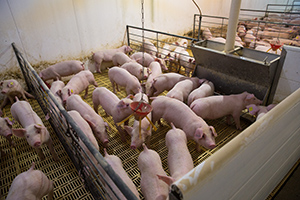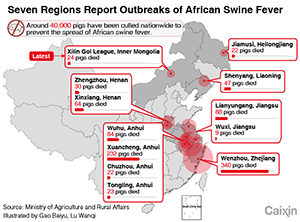African Swine Fever

There have been multiple confirmed cases of African Swine Fever in China (the world’s largest pork producer), Asia and Romania, disrupting the pork industry nationwide valued at $128 billion. The disease originated in Africa and spread quickly. African swine fever is currently developing in 227 locations within 13 counties, with 927 outbreaks (11 of which in commercial farms) and 62 cases in wild boars. Altogether eliminating 311,869 pigs affected by the disease, according to National Sanitary Veterinary and Food Safety Authority (ANSVSA). ASF is contagious to all swine, including wild hogs. This virus can spread through contact between animals, manure, contaminated feed/ingredients, ticks, vehicles, equipment and humans. It is not a risk to humans.
All age groups of swine are equally susceptible of contracting the virus. Clinical signs of ASF may include high fever, loss of appetite, depression, redness of the skin, respiratory distress, vomiting, bleeding and death usually takes place within 2-10 days of being infected with the virus. Currently, there is no vaccine or medication that will cure effected animals. The government will be forced to euthanize all swine within a 2½ mile radius, and not restocking before 40 days, and quarantine swine in a 10-mile radius.
China has now banned the transport of live hogs and pig products from regions bordering provinces that have reported swine fever outbreaks, as well as those that have had cases. It has also banned the use of feed derived from pig blood and banned the use of feeding kitchen waste in 16 provinces. There are also signs that consumers may be avoiding pork, even though African swine fever cannot infect people. Poultry prices have risen in recent weeks, in part because of the disease, industry officials said. In an article on Monday, People’s Daily reminded consumers that people could not catch the disease and urged them not to believe rumors. “Pork bought through standard channels must all go through inspection, the public does not need to worry,” it added.
There is concern about contamination into vitamins and amino acids that come from China and FDA is watching this very closely. Superior Ag is taking preventative measures even though there are no reports in the US. Superior Ag is currently purchasing our vitamins and amino acids from as many American sourced producers as we can. Our delivery trucks are being sprayed with disinfectant on their truck tires at every farm gate entrance. When coming back onto feed mill property, drivers are again spraying disinfectant on all tires for prevention of PRRS, Circo and PED.
Superior Ag has an intensive Biosecurity program in place and complies with all Federal Regulations and Food Safety Processes, along with having a third-party evaluation of our biosecurity program. Superior Ag strives to minimize risk as your livestock nutrition supplier by complying with a strict biosecurity program and following all the recommendations from the Indiana Board of Health & Safe Feed/Safe Food program.
